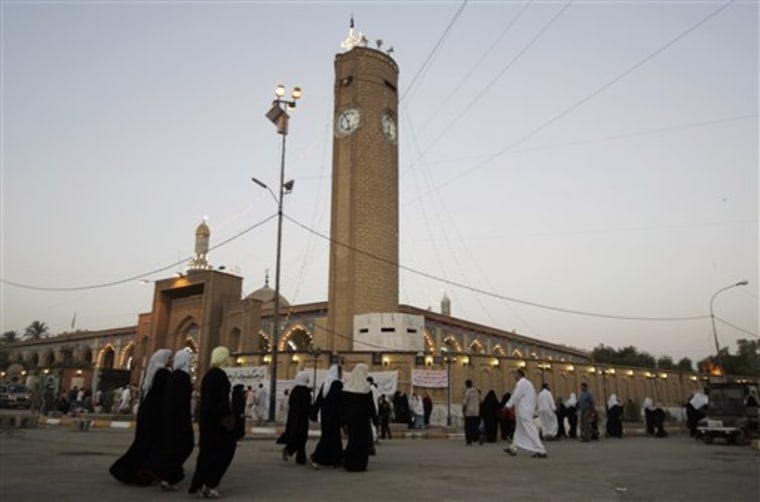The number of Iraqi security forces killed in September rose by nearly a third to 159 compared with the same period last year, Associated Press figures showed Tuesday. U.S. troop deaths for the same period fell by nearly 40 percent to 25 — only eight due to combat.
In the latest attack, an American soldier was killed by small-arms fire Tuesday in northern Baghdad, the military said.
The figures are a sign that Iraqi troops are increasingly taking the lead and being targeted by insurgents seeking to derail security gains that have driven the level of violence down some 80 percent in the last year.
The soldier's death was one of only eight that occurred during fighting in September. The rest were due to non-combat incidents, including seven who perished in a helicopter crash and several in vehicle accidents.
In all, at least 4,176 members of the U.S. military have died in the Iraq war since it began in March 2003.
Iraqi forces taking on bigger role
The U.S. combat death toll in September was in sharp contrast to the number of Iraqi security forces who were killed in attacks.
At least 159 Iraqi police, soldiers and Sunni armed guards who have joined forces with the Americans against al-Qaida in Iraq were killed in September, compared with 120 in 2007, according to AP figures that are based on reports from police and hospital officials.
The 32 percent increase comes as the U.S. military has been increasingly relying on the Iraqis to take the lead in operations so they can take over responsibility for their own security and let the Americans eventually withdraw.
"You have more security forces taking a more active role and they're more likely to be in harm's way," said John Pike, a defense analyst and director of GlobalSecurity.org.
Col. Jerry O'Hara, a U.S. military spokesman in Baghdad, lauded the efforts of the Iraqi security forces and the Sunni groups known as the Sons of Iraq.
"The efforts of the Iraqi security forces and the Sons of Iraq are two of the biggest factors in the increase in security," he said in an e-mailed statement.
Overall civilian casualty figures in September remained relatively low despite a spate of deadly attacks that struck Baghdad and surrounding areas during the Islamic fasting month of Ramadan, which ends Tuesday for Sunnis and Wednesday for Shiites.
'On the right course'
At least 496 Iraqis were killed, a 50 percent drop in total deaths compared with 1,023 reported last September, according to AP figures. That was a slight uptick from the 475 Iraqi deaths in August.
Thirty-two percent of those killed were security forces, compared with 12 percent of the total figure last September, the AP figures showed.
"As long as the civilian numbers stay low compared to a year ago I would say that you're on the right course," Pike said. "An increase in Iraqi security force casualties is an unavoidable consequence of the reduction in the American combat role."
Even as violence in Iraq has plunged in the past year, cautious Pentagon leaders have resisted insistent public and congressional calls for more rapid and hefty troop pullouts. Instead, top commanders insist the security situation remains fragile, and the improvements reversible.
Six Army brigades, a National Guard unit, and three military headquarters have been ordered to deploy to Iraq next summer, the Pentagon announced Tuesday, in a move that would allow the U.S. to keep the number of troops largely steady there through much of next year.
There are now about 150,000 U.S. troops in Iraq.
'Getting better'
Many Iraqis were hopeful for peace as they looked forward to the Eid al-Fitr holiday, which ends the holy month of Ramadan.
About 15,000 worshippers gathered at sunrise Tuesday at Baghdad's revered Abu Hanifa shrine in the former insurgent stronghold of Azamiyah, a heavily guarded area that has been surrounded by a concrete wall. U.S.-allied Sunni fighters stood guard outside the shrine and the nearby cemetery.
"We are happy that we can leave our houses to perform prayers and visit our late beloved ones as we were not able to do so the past," said Umm Ammar, a 54-year-old resident. "We pray to God that we will keep living in such atmosphere with security all over the country."
But others expressed concern about the Ramadan violence.
In the latest attack, a car parked outside a kebab restaurant in the mostly Shiite commercial district of Karradah in central Baghdad killed at least three people, U.S. and Iraqi officials said.
"Before Ramadan, things were getting better, but then it started deteriorating. We do not want things to get as bad as they were before," said Haider Khadhim, a 28-year-old government worker in Baghdad. "We are all brothers, Sunnis and Shiites. There is no difference. We all wish things would improve."
Security gains have been credited in part to a U.S. troop buildup last year as well as the decision by Sunni tribes and insurgents to turn against al-Qaida and back the United States.
The U.S.-funded Sunni movement faces a key test this week when the Shiite-led government begins to assume authority over the groups, also known as awakening councils.
'Peace on this sacred day'
In Mosul, a northern city that remains a security challenge to the Iraqi government and U.S.-backed forces, men in long white robes filled mosques as the city appeared quiet.
"People in mosques pray for peace on this sacred day," said Ahmed Abdul Rahman, 45-year-old photography shop owner. "The situation these days in Mosul does not allow for strolling in the streets in any area or traveling long distances."
Sunnis and Shiites both celebrate Eid, but often begin the festival on different days. Shiites begin the holiday Wednesday.
In the past, that difference has sometimes underlined tensions between the two sects. This year, in an effort to minimize those tensions, the largely Shiite government of Prime Minister Nouri al-Maliki set off the days celebrated by both Sunnis and Shiite as national holidays.
